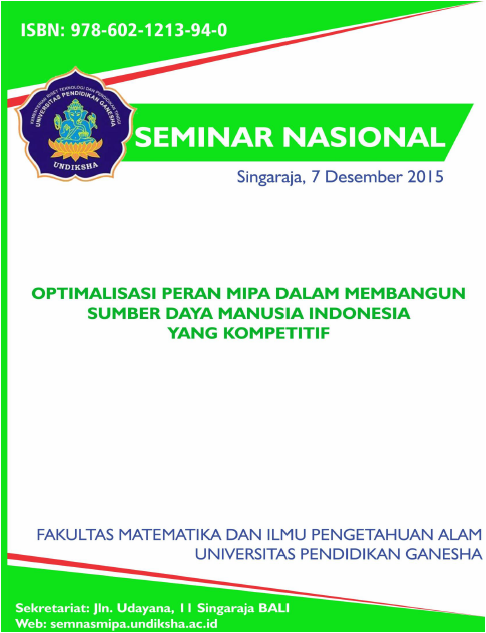KONTRIBUSI KECERDASAN SPASIAL DAN KEMANDIRIAN BELAJAR TERHADAP PEMAHAMAN KONSEP MATEMATIKA SISWA SMA NEGERI DI KECAMATAN BULELENG
Abstract
Penelitian ini bertujuan untuk mengetahui kontribusi kecerdasan spasial dan kemandirian belajar terhadap pemahaman konsep matematika siswa. Populasi dari penelitian ini adalah siswa kelas XI SMA Negeri di Kecamatan Buleleng sebanyak 1372 orang. Sampel ditentukan dengan teknik simple random sampling, dan didapatkan ukuran sampel 300 orang. Data dikumpulkan dengan tes kecerdasan spasial, angket kemandirian belajar, dan tes pemahaman konsep pada materi program linear, kemudian dianalisis menggunakan analisis regresi linear sederhana dan analisis regresi linear berganda. Hasil penelitian menunjukan bahwa kecerdasan spasial siswa tergolong cukup baik dengan rata-rata skor 67,2. Kemandirian belajar siswa tergolong baik dengan rata- rata skor 73,9. Pemahaman konsep matematika siswa pada materi program linear tergolong cukup dengan rata-rata skor 62,0. Selanjutnya, (1) kontribusi kecerdasan spasial terhadap pemahaman konsep matematika siswa pada materi program linear sebesar 36,6%. (2) kontribusi kemandirian belajar siswa terhadap pemahaman konsep matematika siswa pada materi program linear sebesar 11,6%. (3) kecerdasan spasial dan kemandirian belajar siswa secara simultan berkontribusi terhadap pemahaman konsep matematika siswa untuk materi program linear sebesar 42,8%.
Kata-kata kunci : kecerdasan spasial, kemandirian belajar, pemahaman konsep, program linear
Abstract
The main purpose of this research was to know the contribution of spatial intelligence and self-directed learning toward understanding of mathematic concepts. The population of this research was eleven grade of senior high school students in Buleleng sub-district as many as 1372 students. Simple random sampling technique was used to determine the sample of this research, which altogheter 300 students. Data was collected by spatial intelligence test, self-directed learningquestionnaire, and understanding of mathematic concepts in a linear program material test. Data was analyzed by simple linear regression analysis and multiple linear regression analysis. The result indicate that the students spatial intelligence was classified enough level with an average score of 67,2. The students self-directed learning was classified good level with an average score of 73,9. The students understanding of mathematic concepts in a linear program material was classified enough level with an average score of 62,0. Then (1) the contribution spatial intelligence of toward understanding of mathematic concepts in a linear program material is 36,6%. (2) the contribution of self-directed learning toward understanding of mathematic concepts in a linear program material11,6%. (3) spatial intelligence and self- directed learningcontributing simultaneously and significantly toward understanding of mathematic concepts in a linear program material by 42,8%.
Keywords: spatial intelligence, self-directed learning, understanding of concepts, linear program
